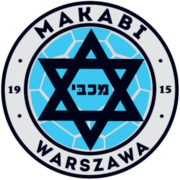
Wronki is a town in the Szamotuły County, western-central Poland, situated in the Greater Poland Voivodeship. It is located close to the Warta River to the northwest of Poznań on the edge of Noteć Forest, and has a population of approximately 11,000.
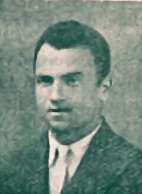
Szymon Datner was a Polish historian, Holocaust survivor and underground operative from Białystok, best known for his studies of the Nazi war crimes and events of The Holocaust in the Białystok region. His 1946 Walka i zagłada białostockiego ghetta was one of the first studies of the Białystok Ghetto.
The interwar period of Polish football began in the late fall of 1918 after First World War, when Poland regained independence, which had been lost at the end of 18th century (see: Partitions of Poland). The newly created country soon started to organize its administration and several national organizations. Among them was the PZPN – Polski Zwiazek Pilki Noznej, which was created on 20 and 21 December 1919 in Warsaw. According to some sources, several officials representing around 30 Polish Football clubs were then present in Warsaw, but the list of them has been lost.
Maccabi World Union is an international Jewish sports organisation spanning five continents and more than 50 countries, with some 400,000 members. The Maccabi World Union organises the Maccabiah Games, a prominent international Jewish athletics event.
Józef Klotz was a Jewish Polish footballer who played centre-half. He scored the first-ever goal for the Poland national football team. He was killed by the Nazis in the Warsaw Ghetto in 1941.

Jutrzenka Kraków was a Jewish minority Polish football club during the interwar period. The club existed until 1939. Fans and players of the club were generally associated with the Bund political party. The main rival of Jutrzenka was the club Makkabi Kraków, which was associated with the Zionist movement and political parties. The matches between the two teams were generally referred to as "Holy War" long before that became a common reference to matches between Cracovia and Wisła.
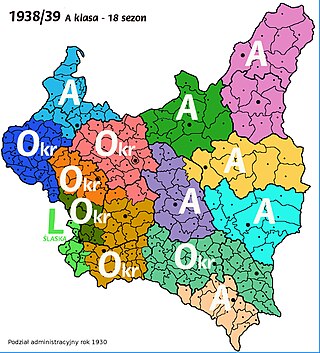
In the Second Polish Republic, there was not a national, Second Division, as we know it today, although the creation of the second division was proposed on several occasions. On Sunday, September 26, 1937 in Częstochowa, a conference of regional teams from across the nation took place, to discuss the creation of the league. Officials of several clubs arrived, such as Brygada Częstochowa, Gryf Toruń, Śmigły Wilno, Rewera Stanisławów, Dąb Katowice, Unia Sosnowiec, Strzelec Janowa Dolina, and WKS Grodno. Also, invited were officials of HCP Poznań, Podgorze Kraków, Naprzód Lipiny and Union Touring Łódź, but for unknown reasons they did not show up. The officials talked about creation of a National B-League, but nothing came out of this project. Instead, in the years 1921-1939, several Voivodeships held their own games and those leagues were known as A-Classes. In 1927, the elite Polish Football League was created, which by the late 1930s consisted of 10 teams. The teams that did not make it to the Ekstraklasa, played in the A-Classes.
Polish culture in the interwar period witnessed the rebirth of Polish sovereignty. The nationhood along with its cultural heritage was no longer suppressed by the three foreign partitioners. The cultural development saw the retreat of the 19th century elite cultures of nobility as well as the traditional folk culture, and the rise of a new mass culture integrating Polish society closer to the new intelligentsia educated in the practice of democracy.
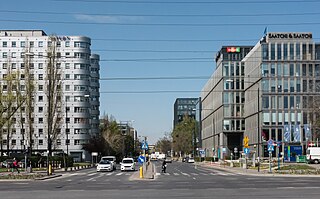
Służewiec is a neighbourhood, and an area of the City Information System, in the city of Warsaw, Poland, located within the district of Mokotów. Most of the neighbourhood consists of the office buildings, which form one of the biggest complexes of office buildings in Poland, and one of the most important office centres in the city. It contains many headquarters of branches of many domestic and multinational corporations. A small portion of the neighbourhood also forms a residential area with apartment buildings.

Lejzor Ilia Szrajbman was a Jewish Polish Olympic freestyle swimmer. In 1935, he was the Polish 400m freestyle champion. He competed in the 1935 Maccabiah Games in Mandatory Palestine, and for Poland at the 1936 Summer Olympics in Berlin, Germany. In 1938, he won a gold medal in the Polish 4x200m relay freestyle championship. Szrajbman was murdered in 1943 in the Majdanek concentration camp.
The Polish Center for Holocaust Research is an academic and research center at the Polish Academy of Sciences in Warsaw, Poland. The center's director is historian Barbara Engelking.
The 2017–18 Polish Basketball League (PLK) season, the Energa Basket Liga for sponsorship reasons, was the 84th season of the Polish Basketball League, the highest professional basketball league in the Poland. The season started on 30 September 2017 and ended 4 June 2018. Anwil Włocławek won its second ever title in club history.

The Battle of Muranów Square was a battle between the Jewish Military Union (ŻZW) and Third Reich troops which took place during the Warsaw Ghetto Uprising on April 19–22, 1943. The fighting between the German pacification forces under Jürgen Stroop, which were destroying the ghetto, and the Jewish insurgent forces of ŻZW, under Paweł Frenkel, took place in the now non-existent Muranów Square.
Daniel Neufeld was a Polish-born Jewish author, poet, and educator.
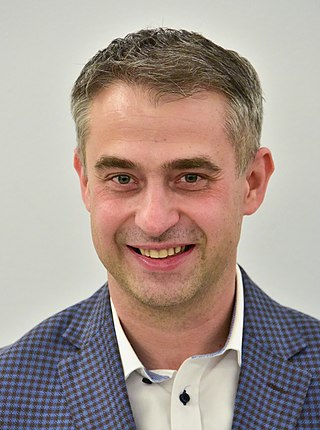
Krzysztof Kamil Gawkowski is a Polish politician and writer.
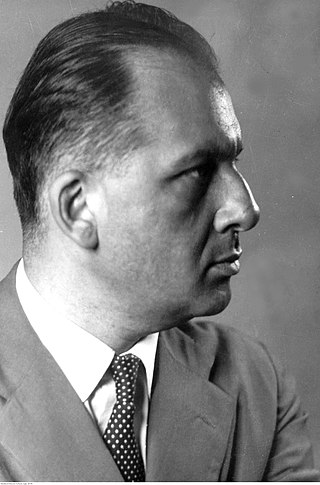
Paweł Hertz was a Polish writer, poet, translator and publisher.

Frascati is a historic neighbourhood and inner-suburb in central Warsaw, the capital of Poland. The area extends eastward from the Three Crosses Square and covers the broad parkland and housing estates surrounding Frascati and Nullo streets, located between the Polish parliament building, the Warsaw Stock Exchange and the National Museum. The neighbourhood was named after the Italian city of Frascati.

KTS Weszło, informally, due to the city of its headquarters, also called KTS Weszło Warszawa, is a Polish football club based in Warsaw, Masovian Voivodeship. It was founded by media and sports group Weszło and is run as a fan-owned initiative.
